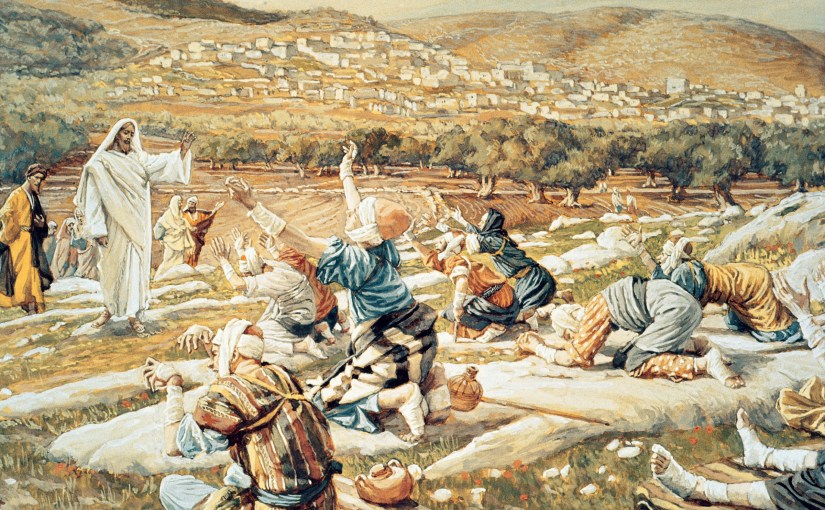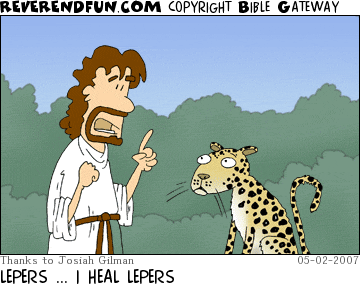Worship Helps for Pentecost 21
Artwork: The Healing of Ten Lepers
Artist: James Tissot
Worship Theme: Our faithfulness as Christians is a
response to the faithfulness God has shown toward us. His love for us when we
were unlovable and his salvation for us when we were without hope are divine
acts of faithfulness. These acts inspire us to thanks and praise.
Old Testament: 1 Samuel 12:20 "Do not be afraid," Samuel
replied. "You have done all this evil; yet do not turn away from the LORD,
but serve the LORD with all your heart. 21 Do not turn away after
useless idols. They can do you no good, nor can they rescue you, because they
are useless. 22 For the sake of his great name the LORD will not
reject his people, because the LORD was pleased to make you his own. 23
As for me, far be it from me that I should sin against the LORD by failing to
pray for you. And I will teach you the way that is good and right. 24
But be sure to fear the LORD and serve him faithfully with all your heart;
consider what great things he has done for you.
1. The Israelites knew they had been wrong to demand a
king like other nations had. Why did Samuel tell them to serve the LORD with
all their heart? (See 12:21 .)
2. The LORD did not promise to forgive them because they
meant well, etc. Why did he not reject his people? (See 12:22 .)
3. Since God is so faithful to whom he is and what he has
promised, are we safe to disobey him? (See 12:24‒25.)
Epistle: 2 Corinthians 1:8 We do not
want you to be uninformed, brothers, about the hardships we suffered in the
province of Asia . We were under great
pressure, far beyond our ability to endure, so that we despaired even of life.
9 Indeed, in our hearts we felt the sentence of death. But this happened
that we might not rely on ourselves but on God, who raises the dead. 10
He has delivered us from such a deadly peril, and he will deliver us. On him we
have set our hope that he will continue to deliver us, 11 as you
help us by your prayers. Then many will give thanks on our behalf for the
gracious favor granted us in answer to the prayers of many.
4. Why did Paul have such deadly perils in Asia ? (See 1:9.)
5. What attitude did Paul have about future perils
therefore? (See 1:10 .)
6. What result did Paul foresee, in the end? (See 1:11 .)
Gospel: Luke 17:11 Now on his way to Jerusalem , Jesus traveled along the border
between Samaria
and Galilee . 12 As he was going
into a village, ten men who had leprosy met him. They stood at a distance
13 and called out in a loud voice, "Jesus, Master, have pity on
us!" 14 When he saw them, he said, "Go, show yourselves to
the priests." And as they went, they were cleansed. 15 One of
them, when he saw he was healed, came back, praising God in a loud voice.
16 He threw himself at Jesus' feet and thanked him-- and he was a
Samaritan. 17 Jesus asked, "Were not all ten cleansed? Where
are the other nine? 18 Was no one found to return and give praise to
God except this foreigner?" 19 Then he said to him, "Rise
and go; your faith has made you well."
7. One leper came back to say “thanks.” What can the other
nine healed lepers teach us about difficult and prosperous times in life?
8. The
Samaritan’s faith had made him well. How?
Answers:
1. Samuel told them to serve the LORD with all their heart
because the only other option was to serve idols, and those were useless. They
could not rescue. Only the LORD can.
2. The LORD would not reject Israel then, and the LORD will not
reject us now, because of his own reputation (“name”). He is the most
consistent, loyal, unchanging One. He sticks with what he starts. He stands by
his promises. What grace!
3. No, we are not safe to disobey the LORD. We must revere
him with all our heart and keep in mind what great things he has done for us.
If we keep doing evil, he will destroy us.
4. Paul said it had happened so that he, and we, might not
rely on ourselves, but on God, who raises the dead.
5. Paul felt that if God had delivered him before, God
would do it again. We look back on past trials, then look forward with the same
confidence.
6. Paul foresaw the Corinthian Christians joining him in
giving thanks to God. Let us do the same whenever God comes through for us and
for fellow believers. (When was the last time you thanked God for bringing your
pastor, or former pastor, through something difficult?)
7. One thing the other nine lepers can teach us is that
the Lord may use trouble in our lives to turn us to him, but we can harden our
hearts to his goodness. We need to be wary of taking his blessings for granted
in times of comfort and prosperity.
8. Like the hand of a small child gripping the mighty hand
of a world champion power-lifter, the Samaritan’s faith hung onto the most
powerful person possible, the Son of God. When Jesus spoke about going to the
priest, the Samaritan trusted that Jesus had the ability to heal him, and his
trust was rewarded.
Putting your faith into action
Imagine
what it must have been like to be the Samaritan leper. He was mixed in with
this group of nine Jewish lepers as Jesus approached. Jesus told them to go to
the priests. The Samaritan leper obeyed Jesus’ command even though he was
forbidden to see the Jewish priests. Full of faith in what Jesus said, he must
have thought, “Surely Jesus will provide a way.” Then imagine the faith it
took, after he was healed, not to complete the journey but to take a chance by
turning back. What if, in turning back, his disease would return? Why did the
Samaritan leper do it? For the praise Jesus would give? Certainly not. It was
just the right thing to do because of what had happened. Our stewardship is the
same. It is the right thing to do because of how much God gives us in Jesus.
Give us this day our daily bread.
Here we consider the poor breadbasket, the necessities of
our body and of the temporal life. For
when you mention and pray for daily bread, you pray for everything that is
necessary in order to have and enjoy daily bread.
It would be very proper to place on the coat of arms of
every pious prince a loaf of bread instead of a lion. This would remind both princes and their
subjects that by their office we have protection and peace. Without them, we could not eat and keep our
daily bread. Therefore, princes are also
worthy of all honor. We should give to
them for their office what we ought and can, as to people through whom we enjoy
what we have in peace and quietness. In
addition, we should also pray for them that through them God may bestow on us
more blessings and goods.
Let this be a very brief explanation, showing how far this
petition extends through all conditions on earth. One could list all the things that are
included, like when we ask God to give us food and drink, clothing, house and
home, and health of body. Or when we ask
that He cause the grain and fruit of the field to grow and mature well. Furthermore, we ask that He give and preserve
for us a godly wife, children, and servants. We ask that He cause our work to
prosper and succeed, favor us with faithful neighbors and good friends, and
other such things. – Large Catechism, Part III The Lord’s Prayer (paragraphs 71-72,
75-76)
Hymns: 562; 573; 576; 571;
579
Refrain:
Lift
high the cross; the love of Christ proclaim
Till
all the world adore his sacred name.
1 Come, Christians, follow where our captain
trod,
Our
king victorious, Christ, the Son of God.
Refrain
2 Led on their way by this triumphant sign,
The
hosts of God in conqu’ring ranks combine.
Refrain
3 So shall our song of triumph ever be:
Praise
to the Crucified for victory.
Refrain
Text: George W. Kitchin, 1827–1912, abr., altered by
Michael R. Newbolt, 1874–1956, alt.
© 1974 Hope Publishing Co., Carol Stream, IL 60188. All
rights reserved. Used by permission.



Comments
Post a Comment